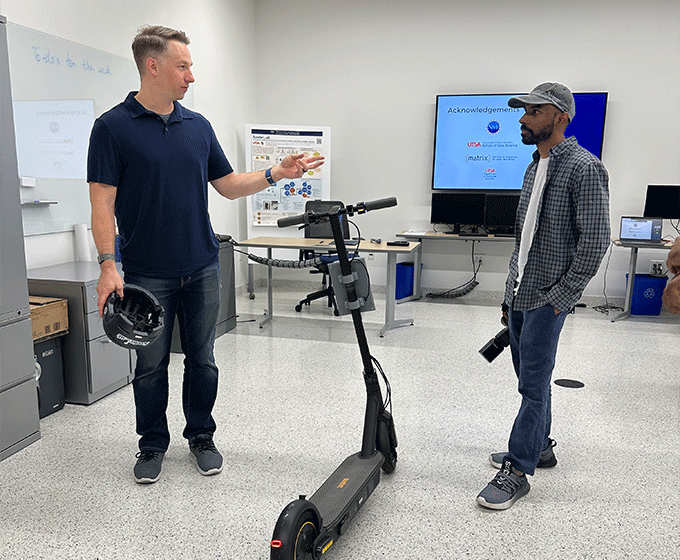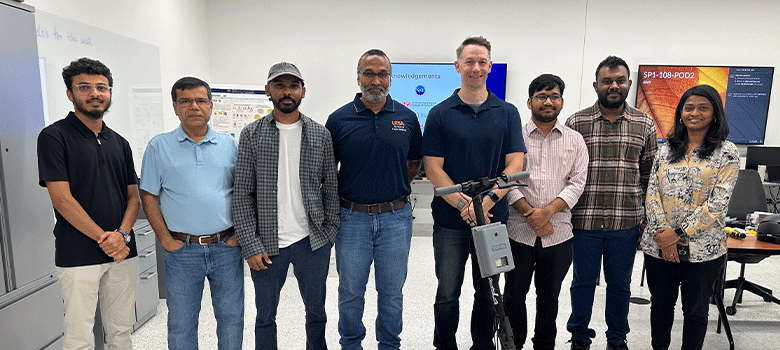
DECEMBER 3 2024 — After years of work, researchers with the UTSA School of Data Science’s (SDS) aptly named ScooterLab have launched the first wave of their sensor-laden e-scooters.
Inspired by a close call with a scooter in 2019, the ScooterLab is the brainchild of Murtuza Jadliwala, an associate professor of computer science and SDS core faculty member. Since its creation, the ScooterLab has received multiple grants, starting with a planning grant in 2020, followed by support from the National Science Foundation to fund its research and development.
E-scooters have long been a popular means of transportation on college campuses and in urban centers, but it was Jadliwala’s idea to affix sensors to them.
“We built the main brain of this vehicle, which is this wireless base station computer (WBSC). It has a variety of sensors including motion sensors, environment sensors and the potential to customize it to include additional sensors based on experiment requirements,” Jadliwala said.

The group behind the ScooterLab, which is located in the UTSA School of Data Science.
By combining the data taken from the scooters’ onboard sensors with data collected from the users via surveys and their own smart devices, researchers in the ScooterLab can analyze where and when the scooters are ridden, who is riding them and how scooter usage varies based on different population segments. The ScooterLab testbed could even offer the potential to help researchers better understand traffic and road conditions and explore how scooters fit into the larger urban mobility infrastructure by analyzing how far riders walk before and after their scooter trips and whether they utilize public transit, ride sharing or private vehicles.
“The possibilities for this infrastructure are endless,” Jadliwala said. “We aim to provide data which can be used for solving rider and pedestrian safety challenges, urban routing and infrastructure planning challenges, engineering and machine learning.”
Since the initial brainstorming session in 2020, the team has overcome numerous challenges to make their scooters work. In many cases, it has been necessary to design many hardware and software elements in-house. These include the software that stores the raw data, the research portal that allows external researchers to access the data and the 3D-printed, weather-resistant enclosure that protects the delicate innards of the ScooterLab WBSC/sensor box.
“Rolling out the first scooters is the result of a lot of hard work and dedication from the entire ScooterLab team,” said Raveen Wijewickrama, ScooterLab’s vehicle and sensing development lead. “We’re thrilled to have reached this milestone, especially after overcoming numerous challenges along the way.”
Now the team faces new sets of challenges, including distributing the scooters to students at UTSA’s Main and Downtown Campuses, finding room to store and maintain the scooters and hiring student workers to check those scooters in and out. However, Wijewickrama believes the benefits to science and the San Antonio community more than make up for hard work.
“Advancing science while working on this is a huge motivation,” he said. “Another exciting aspect is providing a novel testbed and a dataset for the community, something that will contribute to research and practical solutions in the future.”
Such solutions are both immediate and far-reaching. Students will now have free access to the ScooterLab e-scooters, enabling them to scoot around Main and Downtown Campuses quickly and easily. Down the road, the team hopes that the data these scooter trips provide will lead to improvements in city planning and transportation development, advancing the fields of data science and machine learning as a whole.
“It’s incredibly rewarding to see the infrastructure we've built serve a dual purpose, benefiting the community while contributing to scientific progress,” Wijewickrama said. “This is just the start of something much bigger, and we're excited for what’s ahead.”
What’s ahead, specifically, is expanding the ScooterLab. The team intends to scale up the deployment of its e-scooters to accommodate more users over a larger area. It also plans to increase its community-engagement efforts by encouraging user feedback and strengthening research to ensure that the ScooterLab testbed meets the needs of the research community. Finally, the ScooterLab team hopes to invite researchers from various fields to use the testbed for their own projects, enhancing interdisciplinary collaboration to advance the field of data science even further.
This sense of community within the field is an essential element of the ScooterLab, says Jadliwala, who extends his thanks to the many champions of the project within UTSA, the School of Data Science, the National Science Foundation and beyond.
“In addition to all of this work, we’ve been able to build a fantastic team of 12 researchers including six students, and they have come a long way,” he said. “We started off with a couple of students and now we are a well-oiled machine. It’s really fun to see how they work with each other to make things happen.”
The ScooterLab is seeking UTSA students interested in riding the e-scooters as part of the research project. UTSA employees are ineligible to participate. Requirements include completing surveys and documenting travel habits. Student participants are required to undergo safety training and sign a waiver.
UTSA Today is produced by University Communications and Marketing, the official news source of The University of Texas at San Antonio. Send your feedback to news@utsa.edu. Keep up-to-date on UTSA news by visiting UTSA Today. Connect with UTSA online at Facebook, Twitter, Youtube and Instagram.
Move In To COLFA is strongly recommended for new students in COLFA. It gives you the chance to learn about the Student Success Center, campus resources and meet new friends!
Academic Classroom: Lecture Hall (MH 2.01.10,) McKinney Humanities BldgWe invite you to join us for Birds Up! Downtown, an exciting welcome back event designed to connect students with the different departments at the Downtown Campus. Students will have the opportunity to learn about some of the departments on campus, gain access to different resources, and collect some giveaways!
Bill Miller PlazaJoin us for an intimate evening of cocktails, conversation, and culinary inspiration with Pati Jinich, Emmy-nominated chef and James Beard Award-winning author. Enjoy light bites and signature drinks in the warm, modern setting of Mezquite as Pati connects with guests over her passion for Mexican cuisine and storytelling.
Mezquite Restaurant in Pullman Market, 221 Newell Ave., San Antonio 78215From inspired courses to thoughtful pairings and a rich sense of community, the Ven a Comer Signature Dinner is a night of shared meals, shared stories, and unforgettable flavor.
Stable Hall (Pear Brewery), 307 Pearl Pkwy, San Antonio 78215Come and celebrate this year's homecoming at the Downtown Campus with food, games, giveaways, music, and more. We look forward to seeing your Roadrunner Spirit!
Bill Miller PlazaThe University of Texas at San Antonio is dedicated to the advancement of knowledge through research and discovery, teaching and learning, community engagement and public service. As an institution of access and excellence, UTSA embraces multicultural traditions and serves as a center for intellectual and creative resources as well as a catalyst for socioeconomic development and the commercialization of intellectual property - for Texas, the nation and the world.
To be a premier public research university, providing access to educational excellence and preparing citizen leaders for the global environment.
We encourage an environment of dialogue and discovery, where integrity, excellence, respect, collaboration and innovation are fostered.